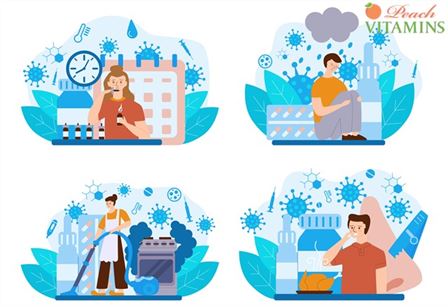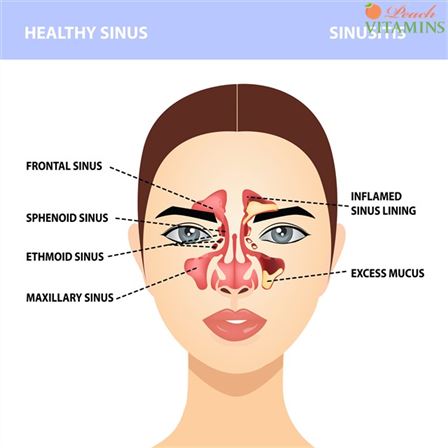The most common reasons for sinus infection are mold, bacteria, allergies, and dust. When you breathe in these nasty things, they cause the inner linings of your nose to swell up. They can also get into your sinus cavities, where they irritate your mucous membranes. This inflammation and irritation causes pain and pressure in your head and face and can lead to a fever and headaches.
Using silver hydrosol for sinus infections is a popular home remedy. This article will help you understand sinus infection, how to cure it at home using silver hydrosol, and how it stacks up against other home remedies.
Years of research have proven that silver hydrosol can successfully fight infections, bacteria, viruses, and fungi. The sterile, non-toxic super-saturated solution of colloidal silver is highly effective against antifungal properties in boosting the body’s immune response.
What’re The Symptoms Of A Sinus Infection?
If you experience symptoms such as a runny nose, sneezing, cough, fever, headache, fatigue, and body aches, then you may be suffering from a sinus infection. These symptoms usually last for about two weeks, and they tend to recur after some time.
Sinus infection symptoms include:
- Fever – If you feel like your temperature is rising, then you probably have a sinus infection. Fever is one of the first signs of an illness. It’s when your body fights off harmful invaders. Your body produces more white blood cells, which attack the bacteria or virus causing the infection.
- Runny Nose – Runny noses are another symptom of sinus infections. You’ll notice that your nose constantly runs, even if there isn’t any reason for it. This is because your nasal passages become congested with fluid.
- Cough – Coughing is another sign of sinus infection. You might find yourself coughing all day long without any apparent reason.
- Headache – Headaches are often associated with sinus infections. They occur when your sinuses become inflamed and irritated.
- Fatigue – Fatigue is another symptom of sinus infection. The buildup of toxins in your bloodstream causes this fatigue.
- Body Aches – Body aches are another symptom of sinuses. The swelling of internal organs causes them due to infection.
Symptoms Of Sinus Infection In Adults
In adults, sinusitis occurs when the sinuses become infected. Several sinus infections include acute bacterial rhinosinusitis, chronic bacterial rhinosinusitis, allergic fungal rhinosinusitis, and viral upper respiratory tract infections.
Acute Bacterial Rhinosinusitis
This type of sinus infection occurs suddenly and lasts only a few days. It’s characterized by a sudden onset of severe frontal and maxillary sinus pain, accompanied by facial pressure, drainage, and tenderness.
Chronic Rhinosinusitis
This form of sinusitis develops slowly over months or years. It’s characterized by persistent frontal and maxillary sinuses pain, accompanied by facial congestion, drainage, and tender swelling.
Allergic Fungal Rhinosinusitis
It’s by a fungus growing inside the sinuses. People who suffer from this kind of sinus infection experience constant frontal and maxillary sinus pain, accompanied by facial swelling, drainage, and tender red areas on the face.
Viral Upper Respiratory Tract Infections
Colds and flu cause these types of sinus infections. They usually begin abruptly with milder symptoms than other forms of sinusitis. However, they can also develop into more severe conditions.
Chronic rhinosinusitis (CRS) is a persistent and debilitating condition affecting up to 15% of the general population [ ]. (ncbi.nlm.nih.gov)
Sinus Pressure On One Side Of Face
The most common cause of sinus pressure is a deviated septum. The septum divides the nasal cavity into two separate chambers. When the septum becomes blocked, it causes stress on the side of the nose where the blockage exists.
A deviated septum occurs when the cartilage that forms the roof of the nose doesn’t grow properly during fetal development. As a result, the bones of the nose don’t fuse correctly, causing the nose to turn outwards.
Sinus Pain And Swelling
The sinus cavities swell up when they become filled with mucus. It is painful and uncomfortable. In the area affected, there is pain. Frequently occurring sinus infections can cause permanent sinus damage.
Causes Of Sinus Infection
There are many reasons why you could be suffering from a sinus infection. Some of these include:
- Poor Oral Hygiene
If you have poor oral hygiene, then you are at risk of developing a sinus infection. Poor dental hygiene leads to bacteria getting trapped in the back of the throat. This can then travel down through the nasal passage and infect the sinuses.
- Smoking
Smokers are at greater risk of developing a sinonasal condition called chronic obstructive pulmonary disease. COPD affects your lungs and airways. If you smoke, you put yourself at risk of developing COPD.
Current smoker, n (%) 0 (0) 0 (0) Past smoker, n (%) 3 (37.5) 4 (33.3) (ncbi.nlm.nih.gov)
- Exposure To Dust Mites
Dust mites live in mattresses, carpets, pillows, and clothing. They thrive in warm and humid environments. Therefore, if you spend time sleeping in such places, you will increase your chances of being exposed to dust mites.
How Long Is A Sinus Infection Contagious?
Fungal infections like rhinitis and sinusitis are contagious. Symptoms appear within 24 hours after exposure. In some cases, the infection can spread to others.
A bacterial infection spreads quickly. It takes only 1-2 days for symptoms to appear. Bacterial infections can spread from person to person via direct contact with infected secretions.
Symptoms of a viral infection last longer than those of a fungal infection. Viral infections can last for weeks or even months.
Chronic infections can remain dormant in the body for years. If an individual has been diagnosed with a chronic sinus infection, they should seek medical attention as soon as possible.
What’s Good For A Sinus Infection?
Antibiotics are not effective against viral infections. Antihistamines help relieve the itching associated with allergies.
Immune health supplements help treat acute sinus infections. These products contain natural ingredients that boost the immune system.
Sinus Headache Treatment At Home
Remedies for sinus infections include home remedies and over-the-counter medications. You can treat sinus headaches at home without having to visit a doctor. Some home remedies include:
1. Warm Compress
Warm compresses are soothing. Use them to reduce swelling and inflammation. Place a hot water bottle or heating pad underneath a towel. Leave it there until the heat starts to relax your muscles. Repeat this process twice daily.
2. Steam Baths
Steam baths are relaxing. They also help clear out congestion. In addition, steam baths can help loosen phlegm and other mucous build-ups in the respiratory tract. Repeat this procedure once every day.
3. Salt Water Gargling
Saltwater gargles are very effective in relieving sinus pain. Mix one teaspoon of salt into half a cup of warm water. Add a few drops of peppermint oil. Stir well. Gargling with unrefined sea salt is more effective than using table salt.
4. Garlic
Garlic contains allicin which helps fight off viruses. You can use garlic cloves raw or cooked. Crush them and mix them with honey. Apply this mixture directly onto the affected areas. Leave it overnight before rinsing it off with water. Repeat this process twice daily until the problem goes away.
Does Colloidal Silver Work for Sinus Infections?
Bioactive silver hydrosol is an excellent remedy for sinus infections. The colloidal form of silver is absorbed through the skin faster than in other states. This makes it more effective when used topically.
Colloidal silver works by killing bacteria and viruses. It also stimulates the production of white blood cells. White blood cells attack pathogens and foreign substances.
Colloidal silver solutions are available from many online retailers. Make sure you buy pure silver nanoparticles. Particles of silver smaller than 100 nanometers are most effective.
Why Is Colloidal Silver So Important?
Antimicrobial activity is highly effective against antibacterial effects and strains of bacteria.
They kill MRSA, E. coli, Candida albicans, and Streptococcus pneumonia.
These microorganisms cause serious illnesses such as ear infections, urinary tract infections, respiratory tract infections, gastrointestinal infections, and vaginal yeast infections.
Adverse effects of colloidal silver include allergic reactions, nausea, headache, dizziness, fatigue, and insomnia.
The best way to avoid these side effects is to take small doses of colloidal silver.
How Does Colloidal Silver Help With Sinus Problems?
The antimicrobial properties of colloidal silver make it helpful in treating sinus problems.
The amounts of silver kill bacteria that cause sinus infections. It also reduces bacterial toxins that irritate nasal passages and inflame sinuses.
In addition, colloidal silver ingredients boost the immune system. It increases the number of white blood cells. These cells destroy bacteria and viruses.
Conclusion
Silver hydrosol for sinus infection is safe and effective. It kills bacteria and viruses. It reduces the number of bacteria and virus particles in the air.
This allows people to breathe easier. It also reduces the chances of catching a cold. Colloidal silver supplementation may reduce the severity of symptoms if taken regularly. Use this natural remedy if you want to get rid of sinus infections fast.
FAQs for Silver Hydrosol For Sinus Infection
What Kills Sinus Fungus?
Fungi cause sinus fungus. Antifungal medications work well to treat fungal sinus infections. They target specific types of fungi. What causes sinus fungus in the first place?
Poor hygiene causes sinus fungus. Poor hygiene includes not washing your hands after going to the bathroom and touching your face.
Washing your hands thoroughly after using facial products can prevent sinus fungus.
Can Colloidal Silver Give You A Headache?
A colloidal silver product can give you a headache. This happens when you take too much of the colloidal silver supplements. If you experience any other adverse effects, stop taking the product immediately. Contact your doctor before continuing treatment.
If you feel nauseous, dizzy, or faint while taking colloidal silver, discontinue its use. Do not drive or operate heavy machinery until you recover.
Contact your doctor if you experience any unusual symptoms.
How Colloidal Silver Compares To Antibiotics For Sinus Infections?
Colloidal silver is more effective than antibiotics at killing bacteria. It works better against resistant strains of bacteria.
Some experts believe that colloidal silver could replace antibiotics in some cases.
It is important to note that both colloidal silver and antibiotics have their benefits and drawbacks.
Both are used to treat different conditions.
Can A Sinus Infection Go Away Without Antibiotics?
Sinus infections can recur even after antibiotic treatment. In such cases, doctors prescribe more potent antibiotics. Some people prefer to try alternative therapies like colloidal silver. The results vary from person to person.
Use colloidal silver as an adjunct to conventional medical care. Consult with your doctor about the proper dosage. You can also schedule a free consultation with Ayurvedic Nutritionist Cosmic Mike. He can help you choose the best colloidal silver supplement for sinus infections.
He will explain how it works and what side effects to expect.
[wps_products product_id=”1638846234659″ html_template=”product.php”]






